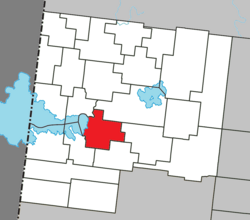Palmarolle
| Palmarolle | |
|---|---|
| Municipality | |
 |
|
 Location within Abitibi-Ouest RCM. |
|
| Location in western Quebec. | |
| Coordinates: 48°40′N 79°12′W / 48.667°N 79.200°WCoordinates: 48°40′N 79°12′W / 48.667°N 79.200°W | |
| Country |
|
| Province |
|
| Region | Abitibi-Témiscamingue |
| RCM | Abitibi-Ouest |
| Settled | 1911 |
| Constituted | April 14, 1930 |
| Government | |
| • Mayor | Marcel Caron |
| • Federal riding | Abitibi—Témiscamingue |
| • Prov. riding | Abitibi-Ouest |
| Area | |
| • Total | 134.10 km2 (51.78 sq mi) |
| • Land | 117.40 km2 (45.33 sq mi) |
| Population (2011) | |
| • Total | 1,465 |
| • Density | 12.5/km2 (32/sq mi) |
| • Pop 2006-2011 |
|
| • Dwellings | 642 |
| Time zone | EST (UTC−5) |
| • Summer (DST) | EDT (UTC−4) |
| Postal code(s) | J0Z 3C0 |
| Area code(s) | 819 |
| Highways |
|
| Website | www |
Palmarolle is a municipality in northwestern Quebec, Canada, in the Abitibi-Ouest Regional County Municipality. It covers 118.36 km² and had a population of 1,465 as of the Canada 2011 Census. It is considered to have the best agricultural land of the entire Abitibi region.
The area began to be colonized in 1911 when the township was surveyed. The completion of the National Transcontinental Railway at La Sarre and Macamic led to further waves of development with the arrival of new settlers in 1916, 1918, and 1929. Following the pattern of other places in the Abitibi, the settlement was named after a historic military figure, François-Charles Bertrand de Palmarole or Palmarolle (1714 ‑ 1760), lieutenant of the La Sarre Regiment and Knight of the Order of Saint Louis. In 1921, the parish was formed and in 1930, the place was incorporated as a municipality.
Population trend:
Private dwellings occupied by usual residents: 569 (total dwellings: 642)
Mother tongue:
...
Wikipedia

